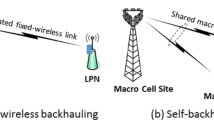Abstract
This paper investigates the pilot power assisted algorithm for the power allocation of the backhaul link in the vehicular heterogeneous small cell networks. In spite of its robustness against pilot power estimation error and existence of quick convergence especially in high signal to interference plus noise ratio (SINR), the pilot power assisted power allocation is sensitive to uncertainty in the backhaul channel gain reciprocity, is referred to as the uplink and downlink channel gains unbalancing. This work specifically evaluates the effect of the uplink and downlink channel gains unbalancing on the performance of the algorithm in terms of the SINR balancing, the load balancing and the outage probability of the vehicular small base stations at the convergence point of the algorithm. Analytical and simulation results demonstrate that aforementioned parameters and advantages obtained from the pilot power based power allocation are completely provided when the correlation coefficient between the shadow fading of the uplink and the downlink of the backhaul is increased. This means that the pilot power based power allocation algorithm is beneficial especially in the vehicular small cell networks whose backhaul link performs as the time division duplexing communication system.




Similar content being viewed by others
References
Rodriguez, J. (2015). Fundamentals of 5G mobile networks (1st ed.). Hoboken: Wiley.
Haider, F., Wang, C. X., Ai, B., Haas, H., & Hepsaydir, E. (2016). Spectral/energy efficiency tradeoff of cellular systems with mobile femtocell deployment. IEEE Transactions on Vehicular Technology, 65(5), 3389–3400.
Duong, N. D., Madhukumar, A. S., & Niyato, D. (2016). Stackelberg Bayesian game for power allocation in two-tier networks. IEEE Transactions on Vehicular Technology, 65(4), 2341–2354.
Mao, T. L., Feng, G., Liang, L., Qin, S., & Wu, B. (2016). Distributed energy-efficient power control for macro-femto networks. IEEE Transactions on Vehicular Technology, 65(2), 718–731.
Tan, C. W. (2016). Optimal power control in rayleigh-fading heterogeneous wireless networks. IEEE/ACM Transactions on Networking, 24(2), 940–953.
Liu, Zh, Wang, J., Xia, Y., Fan, R., Jiang, H., & Yang, H. (2016). Power allocation robust to time-varying wireless channels in femtocell networks. IEEE Transactions on Vehicular Technology, 65(4), 2806–2815.
Subramaniam, M., Anpalagan, A., & Woungang, I. (2012). Performance of a distributed full inversion power control and base station assignment scheme in a cellular CDMA network with hot-spots. Wireless Personal Communications, 65(3), 713–729.
Gantmacher, F. R. (1990). The theory of matrices (Vol. 2). New York: Chelsea Publishing Company.
Lancaster, P., & Tismenetsky, M. (1985). The theory of matrices (2nd ed.). New York: Academic Press.
Horn, R. A., & Johnson, C. R. (1985). Matrix analysis. New York: Cambridge University Press.
Author information
Authors and Affiliations
Corresponding author
Rights and permissions
About this article
Cite this article
Alizadeh, S., Saadat, R. Effect of Uncertainty in the Backhaul Channel Gain Reciprocity on the Performance of Pilot Assisted Power Allocation in Vehicular Small Cells. Wireless Pers Commun 96, 6503–6517 (2017). https://doi.org/10.1007/s11277-017-4488-5
Published:
Issue Date:
DOI: https://doi.org/10.1007/s11277-017-4488-5




